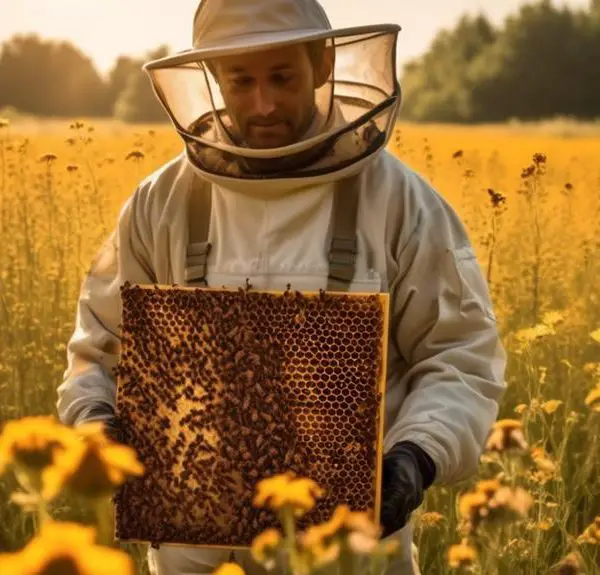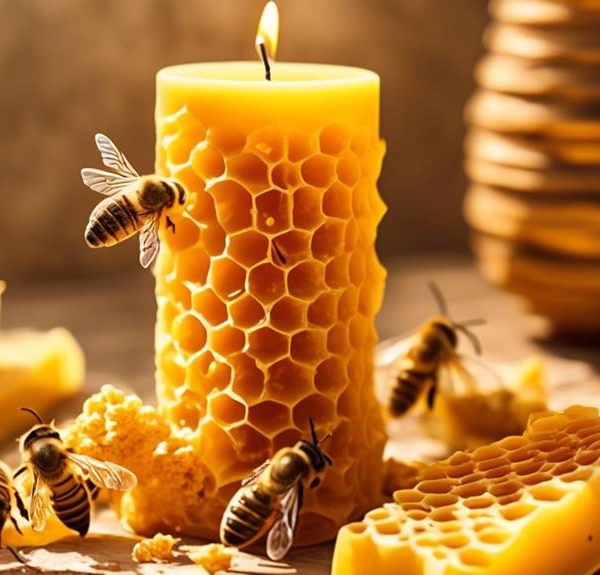Find out how to keep your home and yard bee-free with practical strategies, natural repellents, and professional advice.
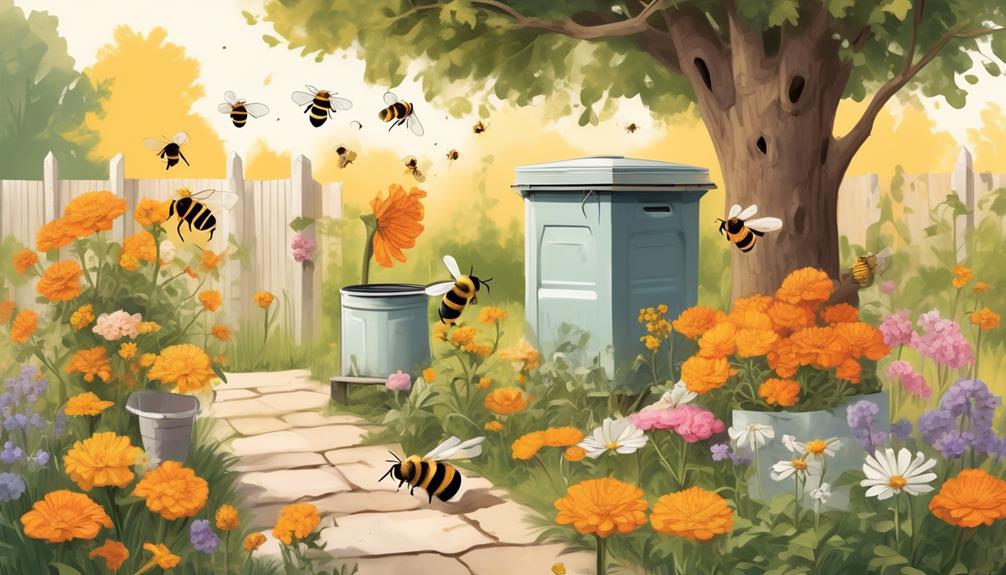
How to Prevent Bees From Coming Back?
Just as you'd secure your home against unwanted intruders, it's crucial to safeguard your space from bees that tend to return. You've likely experienced the frustration of buzzing bees making themselves at home in your yard or even inside your house. Despite our need for these pollinators in the natural environment, their presence in our living spaces can be unnerving, and in some cases, dangerous.
But how can you ensure these winged visitors don't make a comeback? We'll explore practical strategies that you can implement, from understanding their behavior to using natural repellents and professional services.
Stay tuned as we unravel the mystery of keeping your home and yard bee-free.
Key Takeaways
- Remove potential food and water sources that attract bees, such as flowering plants and standing water.
- Use natural bee repellents like peppermint oil, mint plants, cucumber peels, citronella candles, and vinegar mixed with water.
- Bee-proof your home by sealing entry points, installing screens, and eliminating possible food sources.
- If bee-proofing methods are ineffective, call in professionals who follow best practices for bee removal and offer hive removal or sealing services to prevent re-infestation.
Understanding Bee Behavior
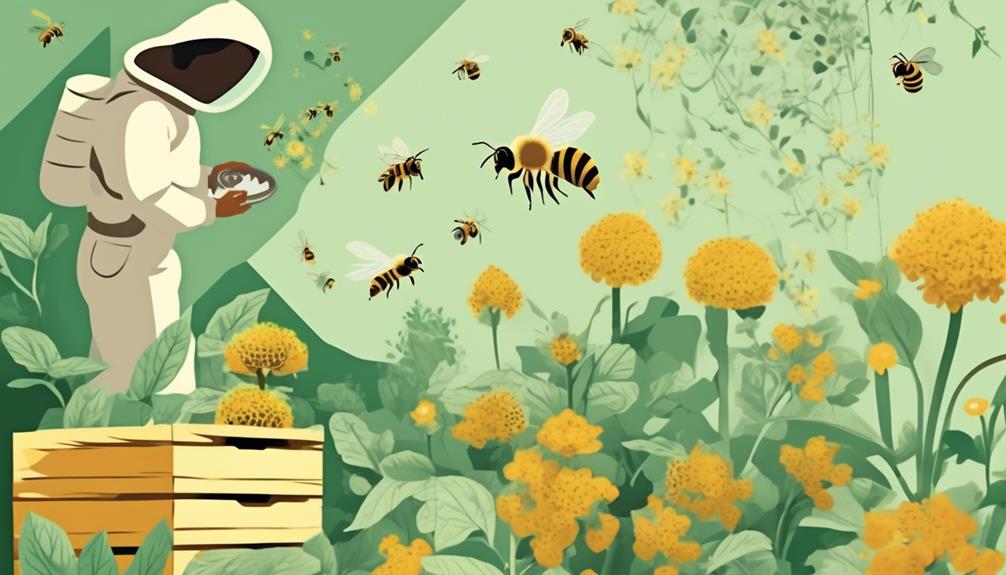
To effectively prevent bees from returning, it's crucial for you to understand their behavior and the reasons why they might be attracted to your property. Bees are foragers, constantly seeking out new food sources. They're especially drawn to sweet things, like nectar from flowers. If you have a garden filled with brightly colored blooms, you're likely to attract bees.
They also need water for survival, so if you have a water source, like a birdbath or pond, bees may find it inviting. Bees are social creatures, living in colonies, so if one bee finds a good food or water source, it'll signal to others in the hive, leading to a whole swarm descending upon your yard.
Understanding bee behavior can help you anticipate their needs and make your property less appealing. Cut down on flowering plants or keep them further from your home. Remove standing water sources and seal off potential nesting spots, like holes in the ground or gaps in your home's structure.
Natural Bee Repellents
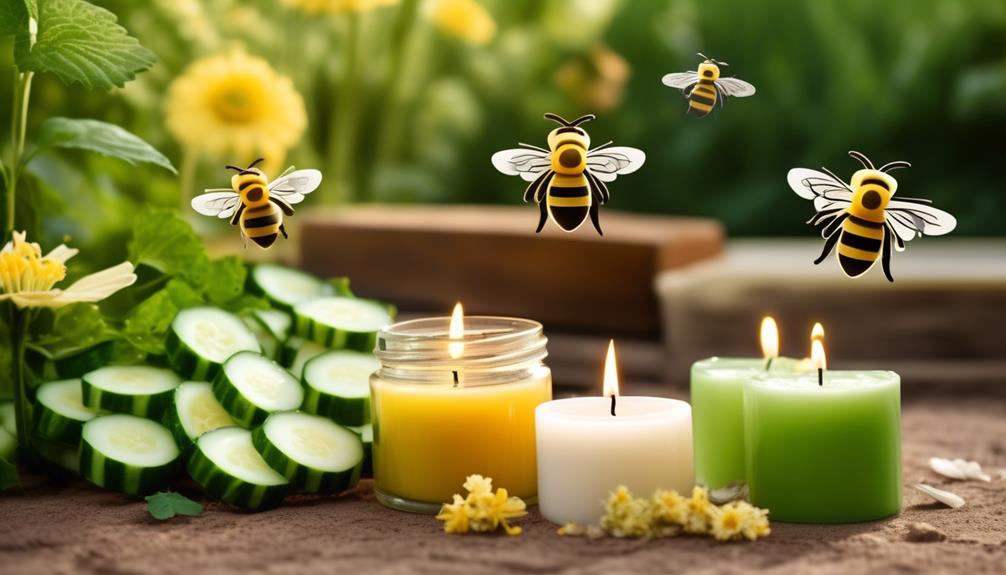
Besides making your property less appealing to bees, you can also use natural repellents to discourage them from settling in your space. There's a range of options you can explore that won't harm the environment or the bees.
One popular choice is peppermint oil. Bees dislike the strong scent, so sprinkling a few drops around their favorite spots can deter them. You can also plant mint around your home as a natural deterrent.
Cucumber peels are another effective solution. Bees hate the taste of cucumber, so scattering some peels can keep them at bay. Just remember to replace the peels regularly.
Citronella candles not only repel mosquitoes but bees as well. Their strong smell discourages bees from coming near. Just ensure you're using real citronella and not just scented candles.
Lastly, vinegar mixed with water can be a potent repellent. Spray this mixture around hives and common bee areas. Bees detest the strong smell and taste of vinegar.
Bee-Proofing Your Home
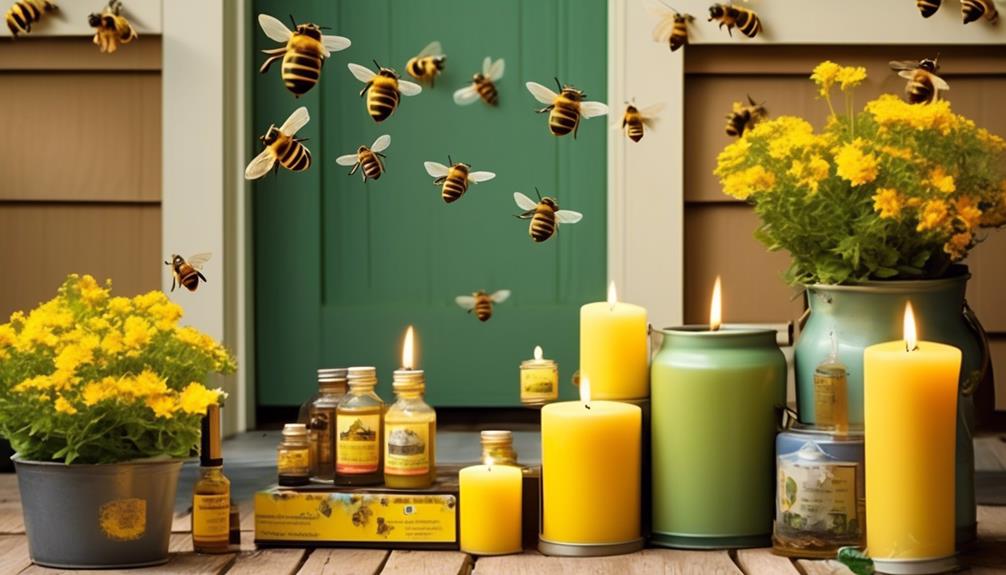
Once you've utilized natural repellents, it's crucial to bee-proof your home to further ensure these buzzing visitors don't return. Bee-proofing your home isn't as daunting as it sounds, and with some practical steps, you can create a bee-free environment.
First, identify and seal potential entry points. Bees can enter through small cracks and crevices in your home's exterior. Use a high-quality sealant to close these gaps. Remember, bees are adept at finding entry points, so thoroughness is key.
Next, remove possible food sources. Bees are attracted to sweet substances and water. So, clean up any spills immediately, cover trash bins, and don't leave ripe fruits or sugary drinks out in the open.
Thirdly, consider installing screens on windows and doors. This won't only keep bees out but also other insects.
Professional Bee Removal Services
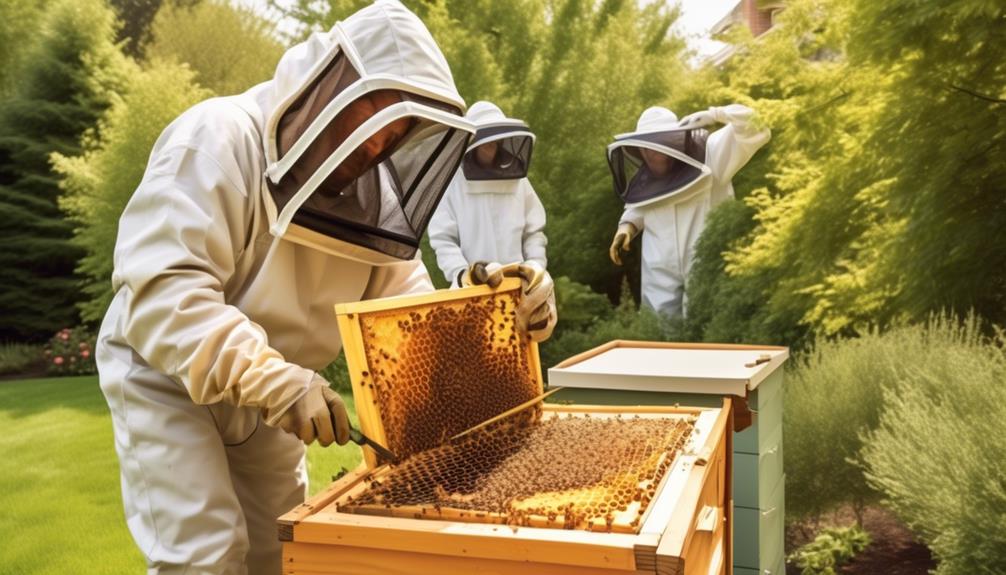
If you've done all you can to bee-proof your home but still find yourself dealing with a persistent bee problem, it might be time to call in the professionals. Professional bee removal services are specially trained to deal with bee infestations safely and effectively. They're equipped with the right tools and protective gear to remove the bees without causing harm to themselves or the environment.
Ensure you choose a licensed and insured service. This ensures that they follow the best practices in bee removal and you're not liable for any accidents during the process. They should also be able to provide a guarantee that the bees won't return.
Once on-site, the professionals will assess the situation, including the size and location of the hive, and the type of bees. They'll then devise an appropriate removal plan, which may involve using smoke, specialized vacuum equipment, or other humane methods to remove the bees.
After the removal, the professionals should also offer hive removal or sealing services to prevent re-infestation. They'll clean up the area, removing any honey, wax, or dead bees that could attract other bees.
Maintaining a Bee-Free Environment
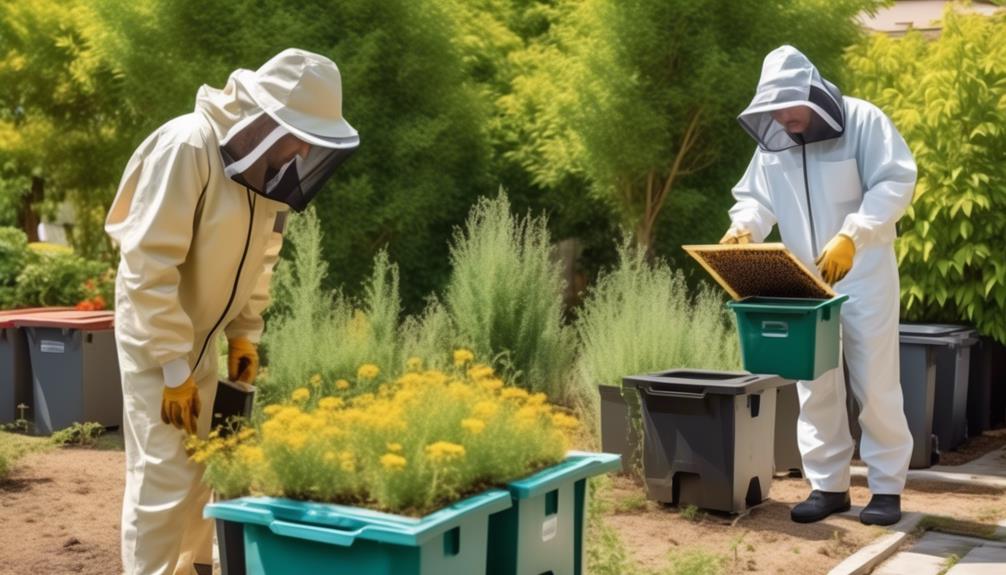
After securing professional help to eliminate the bees, it's crucial to take steps to maintain a bee-free environment in your home and garden to prevent future infestations. Start by closely inspecting your property for any potential nesting sites. Bees often build their hives in trees, shrubs, or within crevices in buildings. Seal up any holes or gaps on your property, especially those in your home's walls, roof, and foundation.
Keep your garden clean and well-maintained. Overgrown foliage, piles of leaves or wood, and standing water can all attract bees. Regularly trim bushes and trees, clear away debris, and ensure your gutters are clean and free of standing water. Also, consider replacing flowers that attract bees with varieties they find less appealing.
Sweet scents can attract bees, so be mindful of what you put outside. Avoid leaving sugary food or drinks around, and consider using garbage cans with tight lids to keep scents contained.
Lastly, reach out to a local beekeeper or pest control company for regular inspections. They can spot signs of a new infestation early and take action before it becomes a problem.
With diligence and attention, you can maintain a bee-free environment.
Frequently Asked Questions
What Are the Health Risks Associated With Bee Stings and How Can They Be Treated?
Bee stings can cause allergic reactions, including anaphylaxis in severe cases. If you're stung, remove the stinger immediately to reduce venom exposure. Apply a cold pack to minimize swelling and take an antihistamine for itching. Seek medical attention if you experience difficulty breathing, rapid heartbeat, or severe swelling.
It's crucial to know your allergy status to bees to prevent serious health risks.
How Can I Identify Different Types of Bees and Determine if They Are Harmful or Not?
To identify different types of bees, you'll need to note their size, color, and behavior.
Honey bees are small and golden; bumblebees are larger, fuzzy, and black and yellow. Wasps are thin and smooth.
If they're aggressive, they might be Africanized honey bees. Remember, most bees aren't harmful unless provoked.
If you're unsure, it's best to keep a safe distance and consult a professional for identification.
Are There Specific Flowers or Plants That Attract Bees More Than Others?
Yes, certain plants do attract bees more than others. Bees are particularly drawn to flowers like lavender, marigolds, and sunflowers because of their bright colors and sweet nectar.
Herbs like mint and basil also entice bees. If you're trying to create a bee-friendly garden, consider planting these.
But if you'd rather keep bees at a distance, you might want to avoid these plants.
What Steps Can I Take to Prevent Bees From Returning if I Have a Pool or Pond on My Property?
To keep bees away from your pool or pond, you've got to make the area less appealing to them.
Start by covering your water sources when they're not in use. Bees are attracted to water, so reducing their access can help.
Regularly check for and remove potential nests.
Finally, avoid using floral or sweet-scented products near the water, as these can attract bees.
It's always good to consult a professional if the problem persists.
Are There Any Legal Restrictions or Considerations When It Comes to Removing a Bee Nest on My Own?
Yes, there can be legal restrictions on removing a bee nest on your own. It's vital to check local and state laws before making any move, as some areas protect certain bee species.
You're also responsible for ensuring your actions don't endanger others. It's often best to hire a professional pest control service, as they're knowledgeable about regulations and safe removal procedures.
Conclusion
In conclusion, understanding bee behavior, using natural bee repellents, and bee-proofing your home can all help keep those buzzing intruders at bay. If they're persistent, consider professional bee removal services.
But remember, maintaining a bee-free environment isn't a one-time job. It requires ongoing efforts. With the right knowledge and strategies, you can keep your home and garden bee-free while respecting these crucial pollinators.
You've got this!

